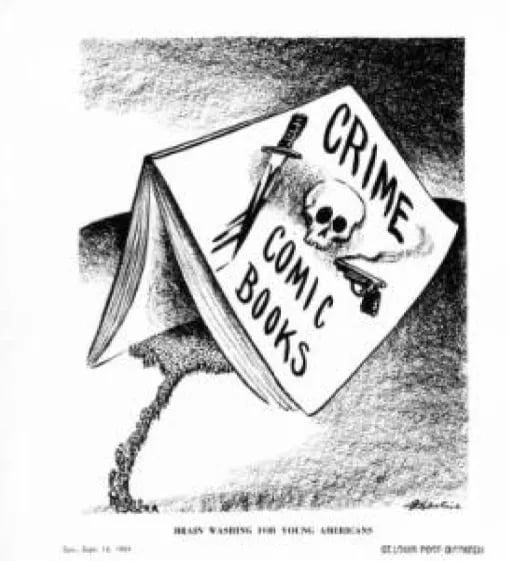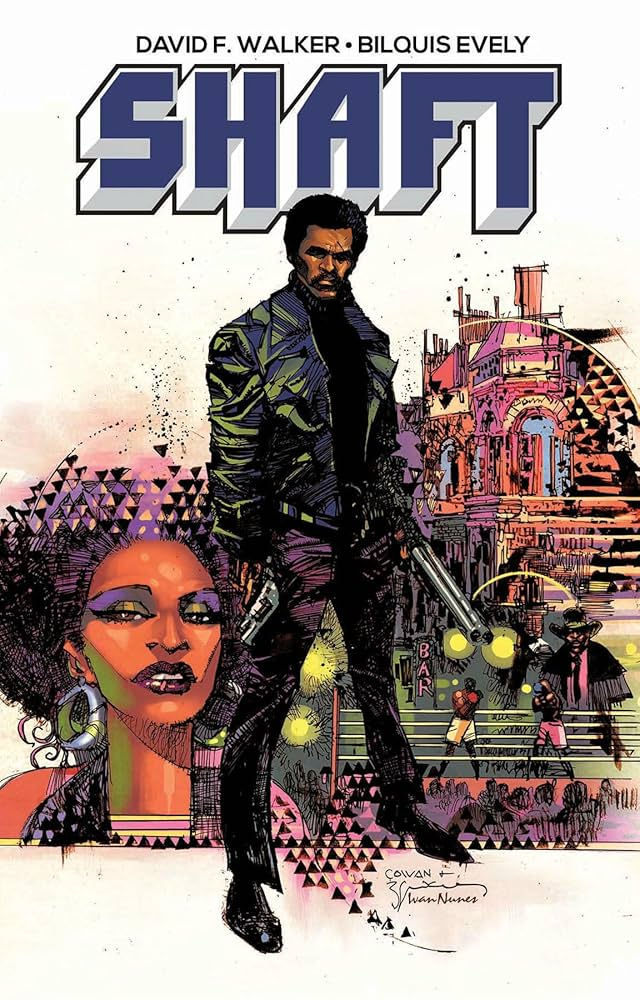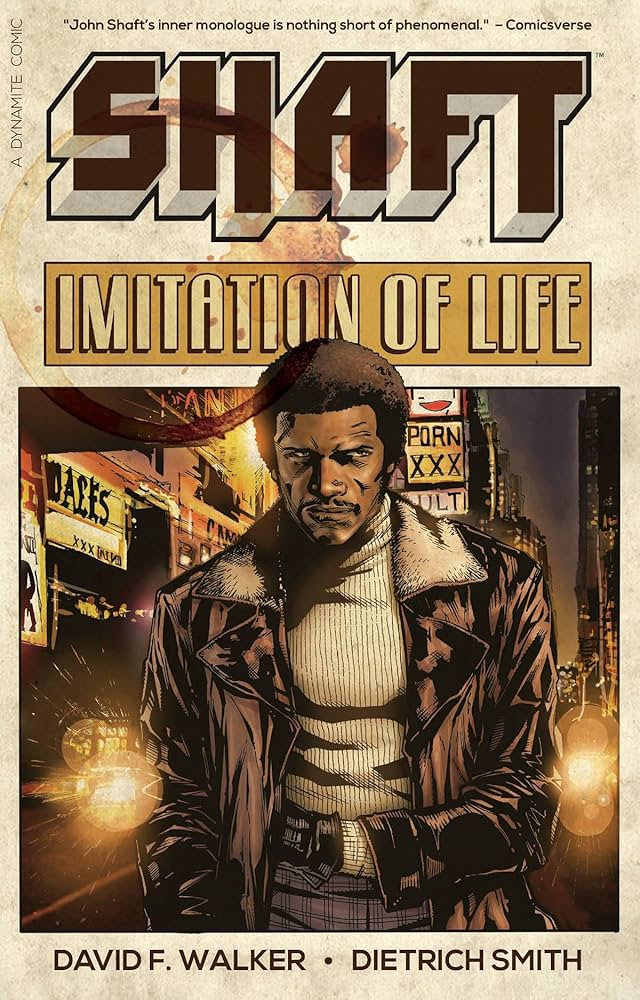Review - Shaft: A Complicated Man & Shaft: Imitation of Life
The hardboiled legacy of John Shaft

Shaft: A Complicated Man was published by Dynamite Entertainment. Issues 1-6 were collected in 2015. Shaft: Imitation of Life was published by Dynamite Enyertainment. Issues 1-4 were collected in 2017.
Shaft (the character, the film series, and original novels) has a complicated legacy and one of the things that Shaft: A Complicated Man sets out to do is grapple with that legacy.


The song “Theme From Shaft” was so popular at the time, and continues to be decades later, you can say “Shaft” to someone and they will respond with some of the lyrics. It’s got to be the most popular call and response song of the last 50 years. I wonder if which lyrics get called back could act as a litmus test for how that person views the character of Shaft. Does the person providing the call back focus on Shaft’s sexual prowess or his heroism and reliability? While the lyrics were intended to evoke a quick sketch of the character, they have so thoroughly saturated the popular consciousness, that the character sketched out by those lyrics has, arguably, been reduced to those lyrics. How many of those people who can reflexively respond with partial lyrics have watched the movie? Further still, how many have read the novels?
The novels have even more potential baggage. In the Fall 1993 issue of Armchair Detective, Aya de Leon wrote a critical piece on John Ball's Virgil Tibbs and Ernest Tidyman's John Shaft titled “The Black Detective in the White Mind: John Ball’s Virgil Tibbs and Ernest Tidyman’s John Shaft”.
"Who are Virgil Tibbs and John Shaft? They have become immortalized in celluloid as the faces of Sidney Poitier and Richard Roundtree. Through their strength, intelligence and defiance, they became archetypal Black heroes in the late 1960s and early 70s, a time when the African-American community was desperately hungry for such films. Such are the cinematic myths, but the question still remains unanswered. Who are they really?
Virgil Tibbs and John Shaft are Black detectives created by two white writers, John Ball and Ernest Tidyman, respectively. The Tibbs series began in 1965, with In the Heat of the Night, and has continued into the 1980s. The Shaft series, which began in 1970 with Shaft, consisted of seven books, the last of which was in 1975. Tibbs and Shaft are among the best known black characters in the mystery genre, due in large part to their success as film heroes.
But while the cinematic Virgil Tibbs and John Shaft managed to be somewhat authentic in their Black heroism, the case is very different in the novels. Although they differed in their approach, both John Ball and Ernest Tidyman had a decidedly limited view of Black heroism, indeed of Black people in general. Ultimately their vision of their protagonists relied more upon racial stereotypes than reality, and worked to both reflect and support their own white perspectives. This dynamic is evident in the way Tibbs and Shaft are presented, the way they perceive themselves, their relationships to the Black community, and to Black women.
A close reading of the Tibbs and Shaft books shows that these books tell much more about the minds of the white authors than the Black detectives'.
…
What Tibbs and Shaft share, however, is that they spring from a constellation of stereotypes that have a common historical origin.”
She goes on to suggest that the characters Virgil Tibbs and John Shaft as written by white authors in their original novels represent a “tom” (Virgil Tibbs) and a “buck” (John Shaft). Her piece is well written and researched, with textual examples, and is worth reading in its entirety. I will not be expanding on or summarizing her position. It’s not my place to do so. But I did want to acknowledge the piece (and point readers to it) and quote from it to further illustrate some of the baggage that the character of John Shaft does carry.
In a Reddit AMA David F. Walker was asked about some of the baggage around Shaft.
“...do you have any particular feelings on how Shaft, still pretty much the closest thing there is to an African-American action icon, was the brainchild of an apparently kind of crazy WASPy guy?”
“I'm eternally thankful that Ernest Tidyman created Shaft. Not only has the character inspired me beyond words, I now have a job because of him. I'm more comfortable with a white creating a character like Shaft, than I am with a guy like Chuck Norris being passed off as a martial arts action star. Tell me Steve James didn't have more charisma and better acting skills than Chuck Norris. I mean come on...oh wait...I'm getting off subject.”
Walker’s quip about Steve James alludes to his non-fiction work on the Blaxploitation genre. Walker wrote the book Reflections on Blaxploitation: Actors and Directors Speak and produced and directed the documentary Macked, Hammered, Slaughtered, and Shafted.
I think it’s also important to acknowledge the ongoing increased Black ownership of the character. With the exception of Shaft in Africa (1973), all of the Shaft films have been directed by Black directors, although it wasn’t until Shaft (2000) that Black screenwriters started to write for the character. The Shaft comics are a part of this ongoing lineage.
In spite of this complicated legacy, John Shaft became an instant popular icon with Richard Roundtree’s portrayal of him starting in the 1971 movie Shaft. The popularity, importance, and influence of his John Shaft cannot be overstated.
In his remembrance of Richard Roundtree upon the actor’s death, Sam Fulwood III wrote:
“Roundtree gave life to the never-before-seen, on-screen alchemy of arrogance and attitude, confidence and charisma, swagger and sexuality in a dark-skinned African American man.”
And that Roundtree
“...was the exemplar, perhaps even the progenitor, of a certain Black male style which later came to be known colloquially as “swag.” Any number of Black men who occupy the public stage today can trace their lineage — culturally speaking at least — to Roundtree’s unforgettable performance. Think Samuel L. Jackson. Will Smith. Denzel Washington. Idris Elba.”
With all of that throat clearing out of the way, let’s talk about the comic. Shaft: A Complicated Man is a prequel. It’s about the man known as John Shaft before he became the legend. Shaft here feels a little softer and kinder. He’s still an undeniable force when he needs to be but his edges are softened just a little. This probably just comes about from adding extra dimensions and facets. This works out well for character development and where he is at in his life at that time. If he was just a human wrecking ball spending all of his story time fucking and fighting, it might please a segment of his audience but it would get old quick. For example, John Shaft finds him in a committed relationship for much of the story.
It would be easy to take the lyrics of the song as a plot outline and pack the story with callbacks and easter eggs. While there are subtle references scattered throughout. What we get here is a sturdy hard boiled crime story with a character named John Shaft.
With something like an origin story already told, Shaft: Imitation of Life leans even more into the hard boiled story type with Shaft taking on a missing persons case that was supposed to be easy and winds up battling the mafia and an illegal porn operation. There’s also a subplot that contains the biggest nod to the original movie yet. John Shaft is a consultant on a cheap schlocky action movie called The Black Dick that is based, somewhat, on his exploits.
“I fell in love with the character of Shaft when I was a kid (after seeing the movie). Then I read the original novel by Ernest Tidyman, and it was a done deal -- I really wanted to do something with the character. This has been something I've wanted to do for more than twenty years. It took a long time, and a lot of effort, but with the help of some great people, Shaft finally made it to comics.”
“I've got a long list of goals for the Shaft comic, but at the top of the list is writing an entertaining and compelling story that honors the work of Ernest Tidyman (Shaft's creator).”
David F Walker did just that. His Shaft comics are both entertaining and compelling.
You just read issue #7 of Bad Karma, Loose Ends & Stray Bullets: Exploring the World of Crime Comics. You can also browse the full archives of this newsletter.